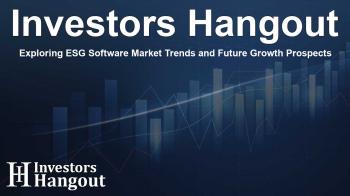Exploring ESG Software Market Trends and Future Growth Prospects

Introduction to the Investor ESG Software Market
The global investor ESG software market is on an impressive trajectory, projected to reach a substantial US$ 3.36 billion by 2031. This significant growth is fueled by the increasing demand for innovative software solutions designed to enhance corporate social responsibility and provide accurate ESG data. The incorporation of generative AI into these platforms has added another layer of sophistication, making them indispensable tools for businesses aiming to align with evolving sustainability standards.
Key Insights and Market Dynamics
A comprehensive report indicates that the investor ESG software market, valued at US$ 1.08 billion in 2024, is expected to witness a remarkable compound annual growth rate (CAGR) of 17.6% between 2025 and 2031. This growth is largely attributed to the rising investor focus on transparent and reliable ESG data. Companies are increasingly recognizing the importance of these tools for meeting sustainability obligations and enhancing their competitive edge.
Growth Drivers in the ESG Software Market
One of the primary catalysts for the growth of the investor ESG software market is the increasing emphasis on corporate social responsibility (CSR). Companies are now required to navigate complex data reporting and compliance challenges due to new regulatory frameworks. As businesses strive to meet stringent sustainable reporting guidelines, the urgency for effective ESG solutions has never been greater. These platforms help organizations efficiently collect, analyze, and report ESG information, which is vital for ensuring compliance with modern regulations.
Regional Trends in ESG Software Adoption
The investment in ESG software solutions is particularly strong in South and Central America, where industries such as agriculture, mining, and energy face mounting pressures related to climate risks. These sectors are increasingly adopting ESG software to assess and mitigate potential environmental impacts. Furthermore, numerous Latin American countries have ambitious renewable energy goals, driving businesses to integrate advanced ESG solutions to maintain regulatory adherence and transparency in sustainability efforts.
Market Segmentation and Competitive Landscape
The investor ESG software market can be segmented based on components into software and services, with the software segment holding a dominant position. Moreover, the market is categorized by enterprise size, distinguishing between small to medium enterprises (SMEs) and large enterprises, with the latter segment being more prevalent in the current landscape.
Leading Players in the Investor ESG Software Market
Several key players are shaping the investor ESG software market, including recognized names like MSCI, Workiva Inc., and Morningstar Sustainalytics. These companies are pioneering innovative solutions that cater to the rising demands for transparency and regulatory compliance across various sectors. As the market evolves, these players are likely to introduce advanced offerings that address ongoing challenges in ESG reporting and management.
The Future of ESG Software
The trajectory of the investor ESG software market indicates vibrant growth driven by increasing demands for sustainability and transparency in business operations. Investors, particularly institutional ones, are integrating ESG criteria into their decision-making processes. This shift not only enhances accountability but also aligns with broader societal goals addressing climate change and social equity concerns.
Moreover, as companies grapple with the complexities of adhering to evolving ESG standards, the need for robust software solutions becomes evident. The growth of the investor ESG software market reflects a broader commitment to responsible investing. Such measures ensure that sustainability becomes the cornerstone of investment strategies.
Frequently Asked Questions
What is the projected size of the investor ESG software market?
The market is expected to reach US$ 3.36 billion by 2031, reflecting a CAGR of 17.6% from 2025 to 2031.
What factors are driving the growth of ESG software?
Key drivers include the increasing focus on corporate social responsibility, regulatory compliance, and growing investor demand for accurate ESG analytics.
Which industries are adopting ESG software solutions the most?
Industries such as agriculture, mining, and energy are actively adopting ESG software to manage climate risks and improve sustainability performance.
Who are the major players in the investor ESG software market?
Leading companies include MSCI, Workiva Inc., and Morningstar Sustainalytics, among others, that are advancing ESG reporting solutions.
Why is ESG software important for investors?
ESG software helps investors assess and manage ESG performance, aligning investment strategies with sustainability goals and regulatory requirements.
About The Author
Contact Addison Perry privately here. Or send an email with ATTN: Addison Perry as the subject to contact@investorshangout.com.
About Investors Hangout
Investors Hangout is a leading online stock forum for financial discussion and learning, offering a wide range of free tools and resources. It draws in traders of all levels, who exchange market knowledge, investigate trading tactics, and keep an eye on industry developments in real time. Featuring financial articles, stock message boards, quotes, charts, company profiles, and live news updates. Through cooperative learning and a wealth of informational resources, it helps users from novices creating their first portfolios to experts honing their techniques. Join Investors Hangout today: https://investorshangout.com/
The content of this article is based on factual, publicly available information and does not represent legal, financial, or investment advice. Investors Hangout does not offer financial advice, and the author is not a licensed financial advisor. Consult a qualified advisor before making any financial or investment decisions based on this article. This article should not be considered advice to purchase, sell, or hold any securities or other investments. If any of the material provided here is inaccurate, please contact us for corrections.

